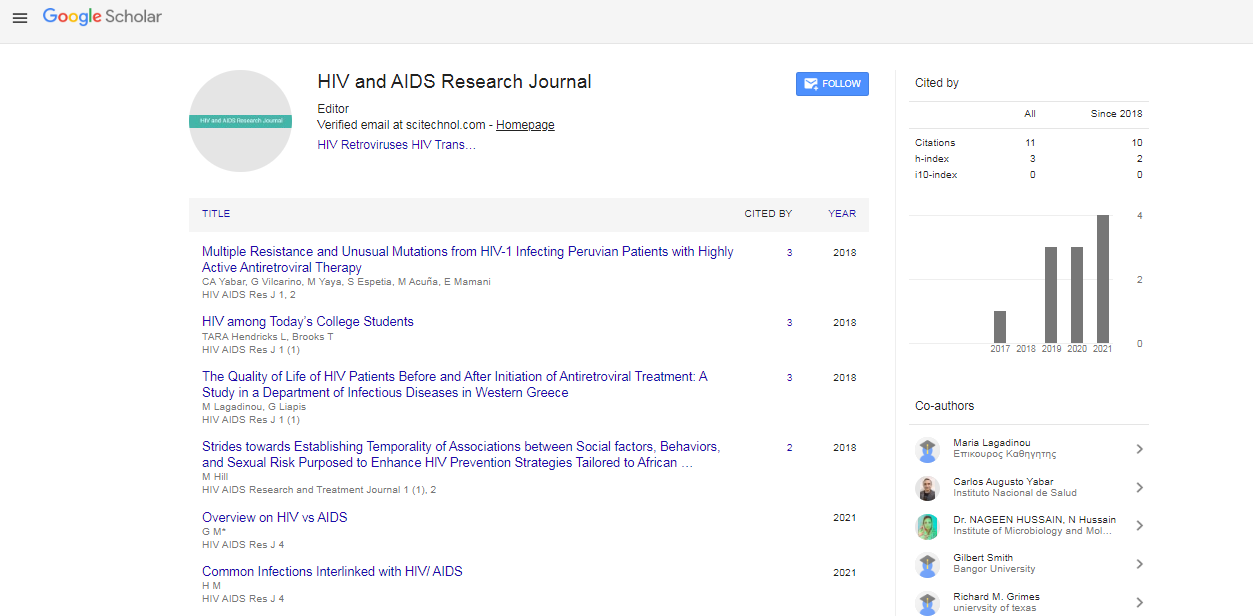Perspective, Hiv Aids Res J Vol: 6 Issue: 1
Prevention of HIV Transmission from Mother to Child
Juan Nick*
Department of General Medicine, Capital Medical University, Beijing, China
*Corresponding Author: Juan Nick
Department of General Medicine, Capital
Medical University, Beijing, China
E-mail: juannick@cmu77.cn
Received date: 20 February, 2023, Manuscript No. HARJ-23-94981;
Editor assigned date: 22 February, 2023, PreQC No. HARJ-23-94981 (PQ);
Reviewed date: 09 March, 2023, QC No HARJ-23-94981;
Revised date: 16 March, 2023, Manuscript No. HARJ-23-94981 (R);
Published date: 23 March, 2023, DOI: 10.4172/Harj.1000124
Citation: Nick J (2023) Prevention of HIV Transmission from Mother to Child. HIV AIDS Res J 6:1.
Description
HIV/AIDS continues to be a global health challenge, with millions of people affected by this devastating disease. Among the most vulnerable populations are infants born to mothers living with HIV. Mother-to-Child Transmission (MTCT) of HIV occurs when a pregnant woman with HIV passes the virus to the baby during pregnancy, childbirth, or breastfeeding. However, with effective interventions and strategies, MTCT of HIV can be prevented, saving lives and protecting the health of both mothers and their children. Preventing MTCT of HIV, an important goal in the fight against HIV/AIDS. Without intervention, the risk of HIV transmission from an infected mother to her child is estimated to be around 15-45%.
However, with appropriate interventions, this risk can be reduced to less than 5%. Prevention of MTCT of HIV is a multifaceted approach that involves a combination of Antiretroviral Therapy (ART), obstetric care, and support for safe infant feeding practices. Antiretroviral Therapy (ART) plays an important role in preventing MTCT of HIV. ART is a combination of antiretroviral drugs that suppress the replica of the virus, reducing the amount of virus in the mother's blood. When taken consistently and correctly during pregnancy, childbirth, and breastfeeding, ART can greatly reduce the risk of transmitting HIV to the baby.
ART not only protects the baby from acquiring HIV, but it also helps to improve the health outcomes of the mother, allowing her to live a longer, healthier life. In addition to ART, obstetric care plays a vital role in preventing MTCT of HIV. Pregnant women living with HIV require specialized care, including regular monitoring of their viral load, CD4 count, and other health parameters. Close monitoring during pregnancy allows for timely adjustments in ART regimens if needed, to ensure that the virus is well-controlled. Moreover, proper obstetric care, including safe delivery practices, can help reduce the risk of HIV transmission during childbirth.
Techniques such as elective caesarean section and avoidance of invasive procedures can significantly lower the risk of MTCT of HIV. Safe infant feeding practices are also essential in preventing MTCT of HIV. Breastfeeding is a significant mode of HIV transmission, accounting for a significant portion of cases where MTCT occurs.
However, in resource-limited settings where access to clean water and safe alternatives to breastfeeding may be limited, breastfeeding may still be recommended due to its nutritional and immunological benefits. In such cases, the implementation of strategies such as exclusive breastfeeding for the first six months, followed by early weaning and appropriate infant feeding practices, can help reduce the risk of HIV transmission while ensuring that the infant receives adequate nutrition. Furthermore, supportive interventions, such as counseling and psychosocial support, are essential components of preventing MTCT of HIV. Pregnant women living with HIV may face stigma, discrimination, and emotional challenges, which can impact their mental health and adherence to treatment.
Conclusion
Preventing MTCT of HIV is an essential component of the global efforts to combat HIV/AIDS. With effective methods and strategies such as ART, obstetric care, safe infant feeding practices, and supportive interventions, the risk of HIV transmission from an infected mother to her child can be significantly reduced. Ensuring access to these interventions for all pregnant women living with HIV is essential to protect the health and well-being of both mothers and their children.
It requires a comprehensive, multi-sectoral approach, involving governments, healthcare providers, communities, and individuals, to develop an enabling environment that promotes prevention, testing, and access to care for mothers living with HIV. It also requires addressing structural factors such as poverty, gender inequality, and lack of access to healthcare that can exacerbate the risk of MTCT of HIV.
 Spanish
Spanish  Chinese
Chinese  Russian
Russian  German
German  French
French  Japanese
Japanese  Portuguese
Portuguese  Hindi
Hindi 